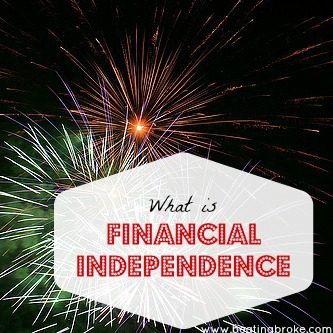In my post “Are we Doing Personal Finance Wrong“, I talked a little bit about “Financial Freedom”. Of all the comments that the post got, that was the one thing that was mentioned most of all. Which, to me, means it bears some further discussion.
Financial freedom, or financial independence, can be defined a little bit differently depending on the person doing the defining. Like most personal finance, it’s highly dependent on the values of the person. What I define financial independence as might be a whole lot different from what you define it as. I think, no matter who is defining it, the real keystone is the word freedom or independence. We all want freedom and independence. Some autonomy from the rat race. The idea of having the financial ability to declare our independence is alluring.
What is Financial Independence, for me.

Something that needs to be said here is that at one point, not that very long ago, I thought of it as being synonymous with “independently wealthy”. Which may or may not be true depending on your definition of independently wealthy. For sure, I don’t believe that it matches up with the definition I had back then. Back then, I would have told you that independently wealthy meant retirement and not doing a dang thing. Sitting on the beach all day, every day, being utterly non-productive. That definition has changed. A lot. Financial independence, if it’s synonymous with independently wealthy, doesn’t mean that you don’t work, but that you have the financial freedom to do the work you want to do. Because you are free from the “need” part of the financial equation, you have the ability to do the work that you feel called to do without regard for how much it pays, whether it’s part-time or full-time, or whether it’s a short term project or not.
What is Financial Independence, for you.
As I mentioned above, your definition might differ slightly (or a lot) from mine. Maybe, for you, it really does mean sitting on a beach somewhere, doing nothing. Maybe it means not having to work and spending all your time volunteering instead.
However our definitions might differ is somewhat irrelevant. Our personal definitions still mean that it’s something worth pursuing to each of us. And, if our end-game is to be financially independent, I still don’t think we’re doing personal finance right. I still don’t think we’re even close. I think we need to break away from the systems we have, find the ones that work for our personal finances, and then achieve our financial independence.
Achieving your Financial Independence.
Breaking away from the systems we have for personal finance won’t be easy. Heck, our definition of financial independence will probably change along the way and require a new system again. But, achieving that financial independence should be our primary goal. Not retirement. Not our childrens’ college education. And certainly not saving up cash to pay for that big SUV. Our primary goal in our personal finance should be achieving financial independence. Once we’ve achieved that, retirement, education, and big trucks will come. And they’ll come without sacrificing anything.
The Path to Financial Independence.
Much like our definitions differ, so too will our path to financial independence differ. Undeniably, I think that the first landmark on that path has to be the complete and utter destruction of all debt. Before we worry about anything else, we have to be free of the yoke of debt. Joan Otto, the community manager at Man Vs. Debt, wrote about this recently specifically referencing retirement accounts. Take a minute or two and read it. Then, pay special attention to the comments. Aside from a few people, almost all of the comments are people who think she’s off her rocker.
Is she off her rocker? Or is she just developing a new system for her personal finance that leads towards her financial independence? It takes a certain amount of courage to admit to the thoughts and ideas that she does in that post. (I should know, see: Why I’m Withdrawing from an IRA) But, then try and remove what you’ve been taught about retirement and saving from your mind for a minute and re-read section 4 of her post. She’s not being irrational. In fact, I’d argue that she’s being overly rational. I think I’ll have to write more about that in another post, but the Vulcan, logic loving, part of me thinks she is right.
Our paths to financial independence will vary. Some of those people in the comments of Joan’s article will achieve it using the current system. Many of them will have started saving early, and found ways to drastically save. But, will they have the liquidity available to make a move on an opportunity in the 30’s, 40’s, or even 50’s? Or will it have to wait until they’re past “retirement” age and have penalty free access to their nest eggs?
Find your path. Start the journey, and achieve your financial independence.
Have you already started on your journey? Have you found your path? Have you achieved your financial independence? There are many of us here, including myself, that are new to the journey or haven’t even begun yet that could benefit greatly from your story. Will you share it with us?
img background credit:Fireworks at Swindon by Stephen_Gunby, on Flickr

Shane Ede is a business teacher and personal finance blogger. He holds dual Bachelors degrees in education and computer sciences, as well as a Masters Degree in educational technology. Shane is passionate about personal finance, literacy and helping others master their money. When he isn’t enjoying live music, Shane likes spending time with family, barbeque and meteorology.


